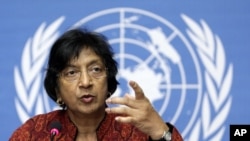GENEVA —
The UN High Commissioner for Human Rights and human rights activists are hailing a UN decision to investigate gross violations in North Korea as a major breakthrough. The creation of a commission is a crucial first step toward holding North Korea accountable for what they describe as crimes against humanity.
North Korea’s human rights record has been under scrutiny by UN human rights bodies for years. But in a landmark decision, the UN Human Rights Council on Thursday, for the first time, adopted a resolution establishing a panel to formally investigate abuses against North Korean citizens.
The resolution, which passed unanimously, calls for a one-year investigation into a wide range of violations, including the right to food, and abuses associated with prison camps, torture, arbitrary detention, and disappearances among others.
In a hard-hitting report earlier this year, the UN High Commissioner for Human Rights, Navi Pillay, described the human rights situation in North Korea as one of the worst and least understood in the world. Pillay said the time had come for a full-fledged international inquiry into the serious crimes that had been taking place in the country for decades, said her spokesman, Rupert Colville.
“She also noted that the spotlight is almost exclusively focused on the nuclear program and rocket launches. So, that is no longer the case now thanks to the Council yesterday adopting this very important resolution…it is not excluding the human rights aspect, which is immense," he said. "Basically, pretty well the whole country is affected by human rights issues.
The UN special investigator on the human rights situation in North Korea, Marzuki Darusman, will be one of the three members of the panel. The two other commissioners have not yet been appointed. The group will have a support team of nine to 12 people.
It is widely expected the fact-finding mission will not be granted access into North Korea, which rejected the planned probe. So, investigators will gather their information from satellite pictures and testimony from witnesses and experts in neighboring countries.
Colville said the commission will submit its report, which he predicted could have a profoud impact, to the UN Council in September.
“Some earlier Commissions of Inquiries played really key roles in moving situations into the area of international justice, for example," he said. "So there was a Commission of Inquiry…in the former Yugoslavia, which predated the Hague Tribunal…So, Commissions of Inquiry - they are not judges, they are not juries. They do not convict, but they do set a very powerful basis potentially for criminal justice systems.”
The North Korean representative in Geneva resolutely rejected the resolution, characterizing it as a product of political confrontation and plot. He said the resolution contains serious distortions, fabrications and accusations about the country’s human rights situation.
North Korea’s human rights record has been under scrutiny by UN human rights bodies for years. But in a landmark decision, the UN Human Rights Council on Thursday, for the first time, adopted a resolution establishing a panel to formally investigate abuses against North Korean citizens.
The resolution, which passed unanimously, calls for a one-year investigation into a wide range of violations, including the right to food, and abuses associated with prison camps, torture, arbitrary detention, and disappearances among others.
In a hard-hitting report earlier this year, the UN High Commissioner for Human Rights, Navi Pillay, described the human rights situation in North Korea as one of the worst and least understood in the world. Pillay said the time had come for a full-fledged international inquiry into the serious crimes that had been taking place in the country for decades, said her spokesman, Rupert Colville.
“She also noted that the spotlight is almost exclusively focused on the nuclear program and rocket launches. So, that is no longer the case now thanks to the Council yesterday adopting this very important resolution…it is not excluding the human rights aspect, which is immense," he said. "Basically, pretty well the whole country is affected by human rights issues.
The UN special investigator on the human rights situation in North Korea, Marzuki Darusman, will be one of the three members of the panel. The two other commissioners have not yet been appointed. The group will have a support team of nine to 12 people.
It is widely expected the fact-finding mission will not be granted access into North Korea, which rejected the planned probe. So, investigators will gather their information from satellite pictures and testimony from witnesses and experts in neighboring countries.
Colville said the commission will submit its report, which he predicted could have a profoud impact, to the UN Council in September.
“Some earlier Commissions of Inquiries played really key roles in moving situations into the area of international justice, for example," he said. "So there was a Commission of Inquiry…in the former Yugoslavia, which predated the Hague Tribunal…So, Commissions of Inquiry - they are not judges, they are not juries. They do not convict, but they do set a very powerful basis potentially for criminal justice systems.”
The North Korean representative in Geneva resolutely rejected the resolution, characterizing it as a product of political confrontation and plot. He said the resolution contains serious distortions, fabrications and accusations about the country’s human rights situation.










